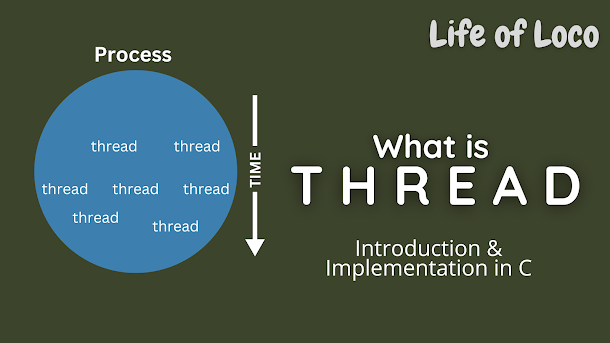Introduction
A thread is a small unit of execution within a process. It is a light-weight process that allows multiple tasks to be executed concurrently within a single process. Threads share the same address space as the parent process and are often used to achieve parallel processing, improved performance, and better resource utilization.
Threads in Operating Systems
In operating systems, threads are a way to provide concurrency and parallelism within a single process. They allow multiple tasks to be executed simultaneously, providing an efficient way to manage multiple operations. Threads are used to perform several tasks concurrently and to achieve parallel processing.
A single process can contain multiple threads, which can run independently and concurrently. Each thread has its own stack and set of register values, but shares the same address space as the parent process. This shared address space allows threads to communicate with each other and to share data.
Implementing Threads in C
Threads can be implemented in C using the POSIX threads library, also known as Pthreads. The Pthreads library provides a set of functions for creating and manipulating threads in C. The following is a basic example of creating a new thread in C using Pthreads:
#include <pthread.h>
#include <stdio.h>
#include <stdlib.h>
void *print_message_function(void *ptr)
{
char *message;
message = (char *) ptr;
printf("%s \n", message);
}
int main()
{
pthread_t thread1, thread2;
char *message1 = "Thread 1";
char *message2 = "Thread 2";
int iret1, iret2;
/* Create independent threads each of which will execute function */
iret1 = pthread_create( &thread1, NULL, print_message_function, (void*) message1);
iret2 = pthread_create( &thread2, NULL, print_message_function, (void*) message2);
/* Wait till threads are complete before main continues. Unless we */
/* wait we run the risk of executing an exit which will terminate */
/* the process and all threads before the threads have completed. */
pthread_join( thread1, NULL);
pthread_join( thread2, NULL);
printf("Thread 1 returns: %d\n",iret1);
printf("Thread 2 returns: %d\n",iret2);
exit(0);
}
In the above example, two threads are created using the pthread_create() function. The first argument to this function is a pointer to a pthread_t data type, which is used to store the thread identifier. The second argument is used to specify the attributes of the thread, and the third argument is a pointer to the function that the thread will execute. The fourth argument is a pointer to any data that needs to be passed to the thread.
Once the threads are created, the pthread_join() function is used to wait for the threads to complete before the main process continues.
Limitations of Threads
Despite their advantages, threads also have some limitations. The following are some of the most commonly encountered limitations of threads:
Synchronization:
One of the biggest challenges with threads is synchronization. Threads can access shared data structures concurrently, which can lead to race conditions and other synchronization problems. To avoid these problems, proper synchronization mechanisms such as mutexes and semaphores must be used.
Deadlocks:
Deadlocks can occur when two or more threads are waiting for each other to complete and are unable to proceed. Deadlocks can cause significant performance problems and must be avoided.
Context Switching Overhead:
Context switching between threads involves saving and restoring the state of the CPU and memory, which can be a time-consuming process. In a system with a large number of threads, the overhead of context switching can become a significant performance bottleneck.
Scheduling:
The scheduling of threads by the operating system can affect their performance. Threads with different priorities may be scheduled differently, which can impact the performance of the system. The operating system must provide an efficient scheduling algorithm to ensure that all threads are executed in a timely and fair manner.
Libraries for Implementing Threads
In addition to the POSIX threads library, there are several other libraries that can be used to implement threads in C. Some of the most commonly used libraries include:
Windows API:
The Windows API provides support for threads on the Windows platform. The API includes a set of functions for creating, managing, and synchronizing threads.
Boost Threads:
Boost is a popular C++ library that provides support for threads on a variety of platforms. The Boost threads library provides a portable and easy-to-use interface for creating and managing threads.
Intel Threading Building Blocks (TBB):
TBB is a C++ library developed by Intel that provides a set of tools for writing parallel programs. The TBB library includes support for threads, task scheduling, and other parallel programming concepts.
Conclusion
Threads are an important concept in operating systems and are widely used to achieve parallel processing and improved performance. In C, threads can be implemented using the POSIX threads library or other libraries such as Boost or TBB. Despite their advantages, threads also have some limitations, including synchronization problems, deadlocks, context switching overhead, and scheduling issues. To effectively use threads in C, it is important to understand these limitations and to use appropriate synchronization mechanisms to avoid race conditions and other problems.





কোন মন্তব্য নেই:
একটি মন্তব্য পোস্ট করুন
Hello there! If you have read any of my blogs, please feel free to give me feedbacks via comments or message. This'll really help me to to improve.
Please don't share any spam via comments.